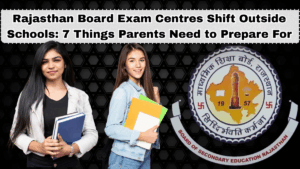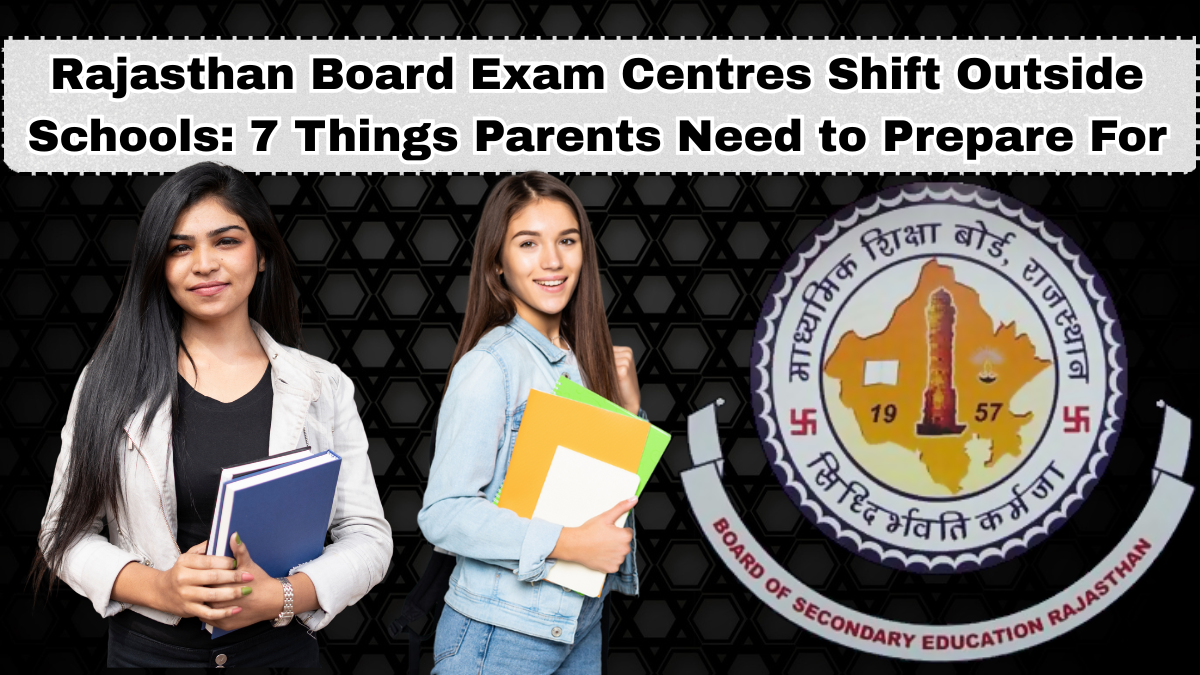The Rajasthan Board of Secondary Education (RBSE) has introduced a major structural change for upcoming board exams—students will now appear for exams in centres outside their own schools. This change applies to both Class 10 and Class 12 students from 2026 onwards. The decision comes after concerns raised over malpractices, unfair advantages and inconsistent invigilation patterns. Moving students to external centres ensures greater transparency, uniform supervision and a fairer exam experience. As discussions grow, parents are eager to understand how this shift impacts daily logistics, safety and exam-day preparedness. The Rajasthan board exam centres outside schools policy is now one of the biggest changes parents must be ready for.
While cities may adjust easily, small towns and rural areas face practical concerns. Parents worry about long distances, transport availability, exam timing, girls’ safety and unfamiliar centre environments. The board assures that the changes are aimed at fairness and improved exam integrity, but families now need better planning. This guide breaks down everything parents must consider well before exam season.

Why RBSE Is Moving Exam Centres Outside Home Schools
The previous system allowed students to write exams in their own school buildings. But this often resulted in issues like inconsistent invigilation, teacher familiarity, lenient checking and in some cases, unfair practices. To raise the credibility of board exams, RBSE has aligned its policy with other national boards.
The new system aims to ensure:
• reduced chances of malpractice
• neutral invigilators
• uniform exam conditions
• equal opportunity for all students
• improved monitoring and security
This change aligns Rajasthan with policies adopted by CBSE and several state boards across India.
How Centre Allocation Will Work Under the New System
RBSE will randomly assign centres through digital mapping based on district and zone. Students may receive centres:
• 3–10 km away in urban areas
• 5–25 km away in semi-rural towns
• 10–35 km away in rural districts (in rare cases)
The board promises to keep travel distance “reasonable,” but parents in remote villages should prepare for longer journeys. The Rajasthan board exam centres outside schools rule requires families to check travel routes at least two weeks before exam day.
7 Things Parents Must Prepare For Before Exam Season
1. Travel Route & Timing Practice
Parents should do a trial run to the allocated centre. Identify:
• exact travel time
• road conditions
• availability of buses/auto rickshaws
• traffic patterns during exam hours
A practice run reduces stress on the actual exam day.
2. Safety Planning for Girls
Parents of girl students must plan safer travel:
• arrange group travel with classmates
• avoid isolated routes
• ensure early arrival
• coordinate with other parents
Safety remains the biggest concern for rural households.
3. Backup Transport Arrangements
Auto breakdowns, bus delays or unexpected problems can cause panic. Parents should have:
• a backup vehicle
• a neighbour or relative on standby
• extra travel buffer time
Exam days require zero-uncertainty travel plans.
4. Managing Weather Conditions
Rajasthan summers are harsh, and winters can be foggy. Parents must prepare:
• water bottles
• umbrellas or caps
• extra time during foggy mornings
• layers during winter exams
Comfort affects performance more than parents realise.
5. Ensuring Students Are Comfortable in New Environments
Many students panic in unfamiliar centres. To reduce anxiety:
• visit the centre beforehand
• show them the classroom layout
• explain instructions calmly
• practice answering in exam-like conditions
This builds confidence and reduces exam-day nervousness.
6. Documents & Roll Number Care
Students must carefully carry:
• admit card
• ID proof (if required)
• stationery kit
• water bottle
Parents should ensure everything is packed the night before.
7. Discipline & Early Sleep Routine
With external centres, morning routines become crucial. Make sure:
• the child sleeps early
• wakes up calmly
• eats a light breakfast
• leaves home with time buffer
Mental clarity improves when the morning is stress-free.
Impact on Students: Mixed but Manageable
Students will initially feel discomfort leaving their familiar school environment. However, this setup helps them grow emotionally stronger and exam-ready for competitive tests like NEET, JEE and state-level exams, which are always held in external centres.
Benefits for students include:
• improved focus
• reduced influence of school teachers
• better exam discipline
• fairer evaluation culture
Disadvantages include travel fatigue and unfamiliar rooms, but with planning, these concerns can be managed easily.
How Schools Will Support Parents
Schools will:
• share centre details early
• organise parent meetings
• coordinate travel groups
• support documentation
• conduct mock exam sessions
• ensure teachers guide students on dos & don’ts
Schools are expected to play a major role in easing this transition.
FAQs
Why is RBSE shifting exam centres outside home schools?
To reduce malpractice, improve fairness and ensure neutral invigilation.
How far will the new exam centres be?
Usually 3–10 km in cities and 5–25 km in rural areas, depending on location.
Will this increase student stress?
Initially yes, but with proper planning and a practice visit, stress reduces significantly.
Can parents request a closer centre?
Generally no, because centres are assigned digitally based on district mapping.
Will this help students prepare for competitive exams later?
Yes, it builds confidence to write exams in unfamiliar centres, similar to JEE or NEET.
Click here to know more.
